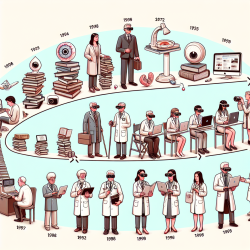Welcome to TinyEYE's blog! Today, we're diving into the rich history of ophthalmology education and sharing some practical tips for practitioners to enhance their skills. The insights are drawn from the research article, "Education in ophthalmology over the past 60 years," by Dr. Bruce E. Spivey. Whether you're a seasoned professional or just starting, there's something here for everyone.
Key Takeaways from 60 Years of Ophthalmology Education
Dr. Spivey's research highlights several critical developments in ophthalmology education. Here are some key takeaways that you can implement in your practice:
- Structured Curriculum: Implementing a structured curriculum with clear learning objectives can significantly enhance the educational experience for both teachers and learners. Consider developing a curriculum that includes both formative (ongoing) and summative (final) evaluations.
- Embrace Technology: The rise of e-learning has revolutionized medical education. Utilize online resources and courses to stay updated with the latest advancements in ophthalmology.
- Focus on Subspecialization: With the trend towards subspecialization, consider pursuing additional training in a specific area of interest. This can not only enhance your expertise but also make you a valuable asset to your team.
- Personalized Education: Tailor your teaching methods to suit different learning styles. Whether it's visual, auditory, or hands-on learning, adapting your approach can significantly improve educational outcomes.
- Utilize Assessment Tools: Incorporate tools like the Ophthalmic Clinical Evaluation Exercise (OCEX) and the ICO-ophthalmology surgical competency assessment rubric to assess and improve your skills systematically.
Encouraging Further Research
While these tips are a great starting point, continuous learning and research are essential for staying ahead in the field. Dr. Spivey's article encourages practitioners to delve deeper into the evolving landscape of ophthalmology education. Here are some areas worth exploring:
- Innovative Teaching Methods: Research new and innovative teaching methods that can be integrated into your practice.
- Educational Outcomes: Study the impact of different educational approaches on learner outcomes and patient care.
- Global Perspectives: Understand the global challenges in ophthalmology education and explore international collaborations to address these issues.
Conclusion
By implementing these strategies and continuously seeking new knowledge, you can significantly enhance your skills and contribute to the advancement of ophthalmology education. For a more detailed exploration of these insights, we highly recommend reading the original research paper.
To read the original research paper, please follow this link: Education in ophthalmology over the past 60 years.










